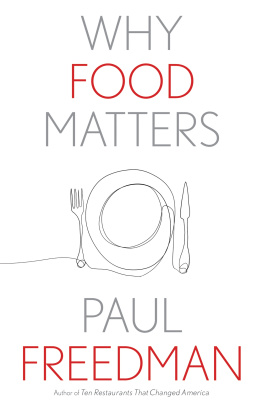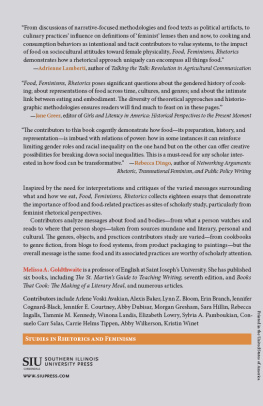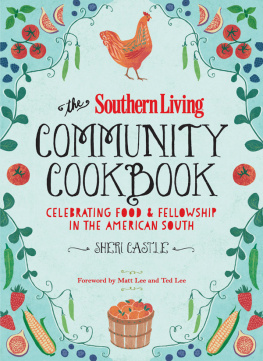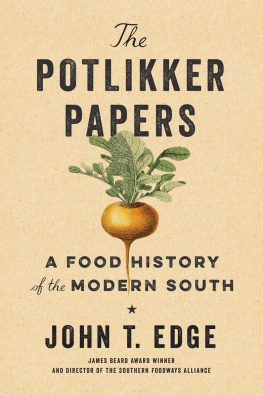www.upress.state.ms.us
Designed by Peter D. Halverson
The University Press of Mississippi is a member of the Association of American University Presses.
Copyright 2016 by University Press of Mississippi
All rights reserved
Manufactured in the United States of America
First printing 2016
Library of Congress Cataloging-in-Publication Data
Names: Stokes, Ashli Quesinberry, author. | Atkins-Sayre, Wendy, 1972 author.
Title: Consuming identity : the role of food in redefining the South / Ashli Quesinberry Stokes and Wendy Atkins-Sayre.
Other titles: Role of food in redefining the South
Description: Jackson: University Press of Mississippi, [2016] | Includes bibliographical references and index.
Identifiers: LCCN 2016008683 | ISBN 9781496809186 (cloth : alk. paper)
Subjects: LCSH: Food habitsSouthern States. | Cooking, AmericanSouthern style. | FoodSocial aspectsSouthern States. | Identity (Psychology)Social aspectsSouthern States. | Southern StatesSocial life and customs.
Classification: LCC GT2860 .S76 2016 | DDC 394.1/20975dc23 LC record available at http://lccn.loc.gov/2016008683
British Library Cataloging-in-Publication Data available
PREFACE
Everyone has a story about a food experience. Whether it is a childhood memory of first encountering a particular food, learning to make a prized family recipe, or going on a pilgrimage to eat at a certain restaurant, it is clear that food plays an important role in our lives. It is clich to say that you are what you eat, yet there is certainly some truth to that saying in that food crafts part of our identities. That is, we recognize that although food serves the mundane role of providing nutrition, it does much more than that. We build family, community, and cultural memories around food. We let foods become symbolic of holidays, special events, and places. For these reasons, we argue that identity is partially cultivated through foods and experiencing certain food culturesin this case, Southern ones.
One of Ashlis earliest memories is attending a summertime family reunion in the mountains of southwest Virginia. She remembers getting out of the car and seeing tables piled with food. After what seemed like an eternity of exchanging greetings, it was finally time to eat. The simple folding tables were arranged loosely by course. First there were breads: still warm yeast rolls, biscuits, and cornbread. Salads were next, the table loaded down with macaroni salad, potato salad, egg salad, various types of coleslaw, and even the Souths bizarre Watergate salad, made with pistachio pudding, canned fruit, and marshmallows. Main dishes followed, with platters of fried chicken, glazed ham, egg salad and pimento cheese sandwiches, and various types of casseroles. Baked beans, green beans, platters of tomatoes and cucumbers, corn on the cob, and even potato chips sat next to these stars of the show. Finally, heaven to a sweet-toothed kid, the desserts: chocolate pie piled high with meringue; pound cake with whipped cream and strawberries; chocolate delight; and platters of homegrown watermelon sprinkled with salt. That endless supply of dishes came to signify what communal eating in the South meant to her as a child. Whether it was a funeral, fellowship in a Presbyterian church hall, the Fourth of July, or just a typical weekend in the summertime, that same collection of dishes would be there, steadfastly anchoring the gathering at hand. Sharing these foods taught Ashli about friendship, family, and who she was as a young girl growing up in Virginia in the late seventies.
One of Wendys most significant family memories was when her mother and grandmother taught her how to make the family cornbread recipe. Step by step her grandmother walked her through the proper way to make the Southern manna, explaining how the German influence in their family probably accounted for the slight amount of sugar (not too muchno sweet cornbread in our family!). The ingredients were never measured preciselyphrases such as heaping spoonful, just about this much, and enough to make it wet had to suffice for the family recipe. And, of course, cornbread was to be made in a well-worn cast-iron skillet handed down through the generations and seasoned to perfection. It was a small task, but at that moment, it was clear to Wendy that she was part of a family tradition. Even a cooking injurythe hot oil dripping onto her hand as she prepared the skilletcouldnt taint this memory. Cornbread might be made from simple ingredients, but those ingredients brought her family together at that moment and made it apparent that she was a vested member. And with the handing over of the family recipe, she became a part of the family story that she would add to and pass down to future generations. This was no mere cornbreadthese were some of the ingredients of the family tradition of breaking bread together.
Not surprisingly, the idea for this project grew out of some delicious shared Southern meals. Having gone to graduate school together at the University of Georgia to study our true academic loverhetoricwe happened upon a shared interest. Ashli had been studying food through the Slow Food movement and, in a roundabout way, Wendy had been studying food through animal rights rhetoric. It struck us that combining our love of rhetoric, social movements, and Southern food might make for some very interesting insight into those areas. What began with one short essay grew into two, and before we knew it, we had so many ideas for projects centered on Southern food that we decided to take the plunge with this book. Selling the idea for this project to others was difficult at times (Yes, grant committee, I AM requesting money to travel through the South and eat!), yet in many ways it was an easy sell. After all, as we mention above, everyone has a food story. As we presented our early works to audiences, we found people eager to add to our collection of stories, jumping at the chance to continue the discussion about food and finding a particular interest in the topic of Southern food. Many papers, presentations, trips, meals, and conversations later, we embarked on this food journey. Our intent was not only to add to our understanding of how food is rhetorical, but also to add to our understanding of how Southern culture is so clearly shaped by its foodways. And, thus, with these goals in mind, we began our effort to prove this connection.
There are several people we would like to thank for their help in this journey. Our departmentsthe Department of Communication Studies at the University of North Carolina at Charlotte, and the Department of Communication Studies at the University of Southern Mississippiand colleges have been supportive both with money and with time. Deborah Gurt and our graduate research assistants, Angela McGowan and Beth Booker, helped track down sources and helped with revisions. Ellen Weinauer, Joyce Inman, Tasha Dubriwny, and Dan Grano read early essays and provided invaluable feedback. Our colleagues, friends, neighbors, and fellow community members were willing to share their food stories (and oftentimes their food), recipes, and opinions. There were numerous offers to accompany us on our food trips, and some even went along for the ride. Those who did so put up with our note taking, videos, and nonstop discussion about food. Our families supported our cross-regional excursions and last minute requests for more time to write. Ward Sayre and Jeff Stokes (as well as Gillian, Owen, Kate, and Charlie) had infinite patience and offered unwavering support, and we thank you, especially. Finally, to our mothers and grandmothers, who began our lifelong love of Southern food, your influence has shaped us more than you can ever know. Wendy wouldnt be the same without Grannys chicken and dumplins, Nonnies Watergate salad, and Moms cobblers and cornbread, while Ashli was shaped by (her) Grannys skillet-fried chicken, her mothers biscuits and pound cakes, and Mammys subversive inclination to take a sip of Jack, sit back, and let the rest of the family cook. To all of our supportersand especially those who fed us physically and spirituallythank you.








